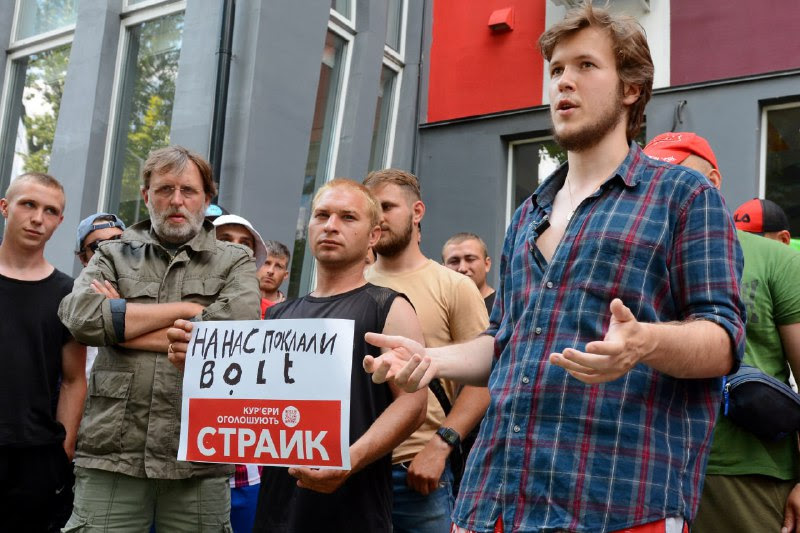
Jul 18, 2022
Despite often heroic efforts to deliver food under war conditions, Bolt delivery drivers in Kyiv, Ukraine, have seen a 60 percent cut in wages—and they are demanding the company take immediate action to boost wages and provide vehicle maintenance support.
Prohibited from striking while Ukraine is under martial law, the delivery drivers gathered recently at Bolt’s office in Kyiv to present the company with their demands, which include an increase in minimum payments from 84 cents per order to $1.36 per order, and a boost in per-kilometer pay from 24 cents to 41 cents to compensate for the rise in inflation.
“Our wages have been cut to the minimum,” a driver stated at the gathering. “Now they are trying to force us to work for pennies. It is almost impossible to feed one person on such a wage.”
Another driver said he must “work 14 hours a day, 27 days a month” to survive.
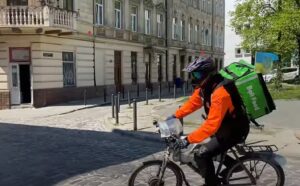 The app-based workers also are urging the company to provide free or low-cost repair and maintenance for their vehicles, most of which are bicycles and motorbikes.
The app-based workers also are urging the company to provide free or low-cost repair and maintenance for their vehicles, most of which are bicycles and motorbikes.
“Bolt Food does not compensate our work expenses in any way,” a driver said. “We bear the risks ourselves. We have to maintain transport at our own expense, we have to pay for fuel, spare parts—and all prices just skyrocketed but our wages were further reduced. These costs reach 70 to 75 percent of income at current prices.”
In addition, workers want Bolt to re-open several app features, such as one that enables drivers to see the client’s address before they accept the job. If the restaurant where they pick up the food is only a few blocks from the client, they only are paid for the short distance from the restaurant to the client’s location, even if they drive miles to get to the restaurant.
Earlier this year, Bolt Food riders in Lviv raised similar demands with the company after Bolt cut wages so drastically workers could not afford gas for their vehicles. Many Ukrainians relocated during the war to Lviv, a relatively safe haven near Poland’s border, and delivery drivers say Bolt took advantage of their plight as they desperately sought jobs to support their families. The delivery drivers won a wage increase July 5 that includes a boost in the amount drivers receive when delivering food during peak times, weekends, late hours and in bad weather, a feature Kyiv delivery drivers also are seeking.
Massive Job Loss and Attacks on Worker Rights
The company’s cutback in wages comes as more than one-third of jobs in Ukraine have been lost since the beginning of the war in February, according to an International Labor Organization report in May. The ILO projected job losses to reach 7 million, or 43.5 percent of the workforce, if the war continues.
Even as the war has decimated jobs and the economy, Ukraine’s parliament passed a law that would significantly erode employees’ rights in areas covering working hours, working conditions, dismissal and compensation after dismissal. The law makes it legal to fire employees who are on sick leave or vacation and allows employers to increase the work week from 40 hours to 60 hours, shorten holidays and cancel additional vacation days. A union’s rights also would be severely curtailed and employers would have the right to unilaterally cancel collective bargaining agreements.
Lawmakers say the legislation would apply only during war. But George Sandul, a lawyer with the Ukrainian worker rights organization Labor Initiatives, says unions and legal experts fear the law will not be revoked.
The legislation did not stem from the war. Similar proposals were pushed months before Russia invaded Ukraine, with the parliamentary committee for social policies and the Ministry of Economy pressing to radically change labor law to favor employers and restrict union rights.

May 25, 2022
The Anna Lindh Memorial Fund in Stockholm awarded a special prize to the Trade Union Lifeline in Kyiv, Ukraine. The Lifeline is run by an informal group of primarily young trade union activists from key economic sectors such as railways, public service, food processing, delivery services and the platform or “gig” economy which aims to utilize union networks to quickly move humanitarian aid through the country to areas of emergency need.
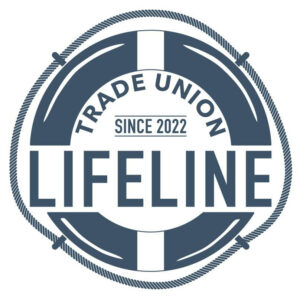 The Solidarity Center and its Ukrainian partner, Labor Initiatives, are key participants in the Trade Union Lifeline, and the Solidarity Center’s Kyiv office is the main hub for its activities. Since the beginning of the war, the Lifeline has worked to link workers in key industries with charitable organizations and other civil society groups to move food, medical supplies, and other needed items to war-impacted communities. The LI’s Donbas office in Dobropillia has been a critical hub for this support and has helped thousands of refugees in the region find safety in other parts of Ukraine.
The Solidarity Center and its Ukrainian partner, Labor Initiatives, are key participants in the Trade Union Lifeline, and the Solidarity Center’s Kyiv office is the main hub for its activities. Since the beginning of the war, the Lifeline has worked to link workers in key industries with charitable organizations and other civil society groups to move food, medical supplies, and other needed items to war-impacted communities. The LI’s Donbas office in Dobropillia has been a critical hub for this support and has helped thousands of refugees in the region find safety in other parts of Ukraine.
“The youth network Trade Union Lifeline has, through admirable relief efforts in Ukraine, shown proof of real union solidarity, not only for members but also broadly in Ukrainian society,” says Lena Hjelm-Wallén, chair of the Anna Lindh Memorial Fund.
The Anna Lindh Memorial Fund annually honors individuals and organizations that help others and strive for a more humane and just world. The Fund was created soon after the assassination of Anna Lindh, a Social Democratic politician whose two-decade career included service as a member of the country’s parliament, the Riksdag, Deputy Mayor of Stockholm, and Minister of Environment and Foreign Affairs.
The Fund’s $5,550 prize will be awarded at a ceremony in Stockholm on June 16.
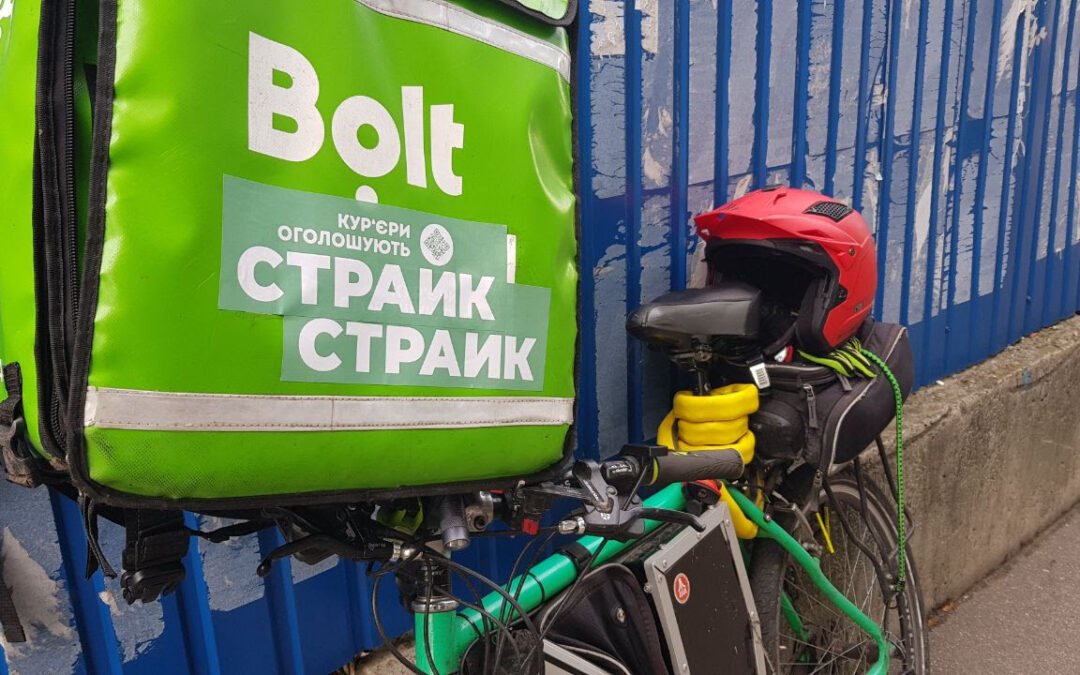
May 18, 2022
Platform delivery workers in Ukraine, many of them displaced from their homes, are demanding decent wages as they continue to work in the midst of war.
On May 12, delivery drivers in Lviv went to Bolt Food’s headquarters to deliver their suggestions and seek an open dialogue with the company. Participants dressed to conceal their identities because they say the company has punished workers in the past with “robo-firings” and “robo-suspensions” by excluding them from the app.
Many of the delivery riders in Lviv have fled cities impacted by the war in Ukraine. In several cases, they are homeless or the only breadwinners left for their families.
In a video produced by Ukraine’s Labor Initiatives, workers describe their situations.
“I am from Mykolaiv,” says one worker. “Mom and Dad lost their jobs there. I don’t have a place to live here and I don’t even have enough money to eat. Bolt … said they would support favorable conditions. Both for themselves and for couriers. But they simply did not warn anyone, removed the minimum pay, lowered all the ratios.”
“How are the IDPs supposed to live,” he asks, “who have no housing, no work [and] don’t have anything to eat?”
Another worker describes the deterioration in pay. “They took away the minimum payment for delivery. And the ratios were reduced by almost half. Here a colleague has calculated that it, approximately, will give a reduction of wages by 52 percent.”
Workers said the company has failed to explain the reasons for the changes. Meanwhile, workers who rely on cars and motorcycles and have to keep their vehicles fueled in order to work face rising gas prices.
“Fuel is among my expenses,” said one worker. “Now I don’t know if I can even pay for it.”
The demands of these workers clearly show that platform-based companies abuse worker rights in extreme environments using the technology the companies have set up to maximize profits.
Delivery companies are “not regulated properly,” one delivery rider said. “Each service acts as they want. Some platforms employ people as ‘private entrepreneurs,’ some just saying ‘You are plugged into the platform” and you should be grateful for it. Because of that, many issues arise.
“And if after all this,” he continued, “some trade unions … will be formed, that will be great. People should have the instrument to solve the issues. Strange as it may sound, that may even be worth their lives.”
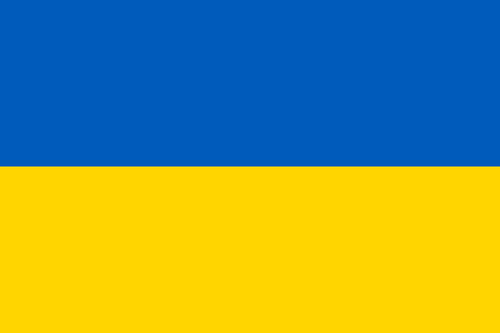
Mar 11, 2022
A number of Ukrainian trade unions, including the national union of nuclear plant workers, have donated portions of their salaries to Ukrainian aid and defense charities. In the first 10 days of the war, these trade union salary donations amounted to nearly $500,000.
One of the largest private-sector unions in Ukraine, the trade union of Nova Poshta (a shipping and logistics firm with operations also in Europe and the United States), conducted national and international fundraising to support its members displaced and in need, as well as the families of volunteers for Ukraine’s Territorial Defense Forces. In the first week of the war, the Nova Poshta trade union collected 795,000 hryvnia (about $27,000) for member assistance. In the first few days of outreach, 118 internally displaced people and refugees received aid, as did 45 families of members who were mobilized. The union expects this aid effort to grow quickly in the weeks ahead.
The Nova Poshta union, founded in 2015, signed its first collective bargaining agreement in 2016. Its pre-war membership was approximately 14,000 workers, and the collective agreement covers 27,000 employees.
The union’s work is in addition to that of the company, which is delivering humanitarian assistance from around the world to locations where it is needed most in Ukraine.
Although the Nova Poshta union is particularly active in solidarity support, many others are also assisting members during this crisis. These include fundraising and mutual aid efforts by the Union of Metal and Mining Workers, which has contributed over $35,000 to support families of mobilized soldiers.
Here’s How You Can Help
You can help Ukraine’s workers and their families by donating to the ITUC’s emergency fundraising appeal. The ITUC’s Ukrainian member organizations, FPU and KVPU, are providing support to families who desperately need assistance with food and water, medical supplies and hygiene items. Donate here.
You can also support these organizations also providing emergency assistance to people under bombardment or seeking refuge from the war:

Mar 4, 2022
Statement by the NED Family: The National Endowment for Democracy, the National Democratic Institute, the International Republican Institute, the Center for International Private Enterprise, and the Solidarity Center:
Vladimir Putin’s illegal and unjustified attack on a sovereign, free Ukraine is a watershed moment in the struggle for human freedom. To meet this moment, we are determined to support democracy activists on the frontline with the same sense of urgency they bring to their own national struggle. The National Endowment for Democracy (NED) and its four core partners—the National Democratic Institute (NDI), the International Republican Institute (IRI), the Center for International Private Enterprise (CIPE) and the Solidarity Center—stand in support and solidarity with our Ukrainian grantees, partners, staff, and their loved ones in Ukraine.
Since gaining independence in 1991, the people of Ukraine have time and again demonstrated their overwhelming desire to live in a free and democratic nation. We have been inspired as millions of Ukrainians have worked tirelessly and optimistically to build democratic institutions and practices in their country. Ukraine’s progress and commitment to this goal is what threatens and provokes Vladimir Putin. A democratic example on Russia’s border and a people with a shared culture and history who choose their own leaders, hold them accountable, and display a clear desire to join the community of democratic nations, represent an existential threat to Putin’s more than two-decade rule in Moscow and his ambition to dominate Russia’s neighbors.
Ukraine today is the epicenter of the fight for freedom in the world. The courage of the Ukrainian people—their willingness to risk everything to confront Russian aggression and defend their homeland—is an inspiration. They are a powerful example to all those worldwide who are joined in the struggle against authoritarian regimes that deprive free peoples of their basic rights and liberties, steal national wealth, attack and imprison political opponents, and silence independent media.
So too are the thousands of Russians and Belarusians who have risked arrest or worse to protest this criminal act of aggression. On Sunday, February 27, 2022, more than 10,000 people visited the memorial near the Kremlin marking the spot where Putin’s democratic rival, Boris Nemtsov, was assassinated seven years earlier. This is what Putin, and all dictators fear—ordinary citizens who would like to choose their leaders in free and fair elections and hold those leaders to account.
As the Ukrainian people struggle to preserve their sovereignty, their democracy, and their hopeful future, it is time for all those worldwide who live in freedom to rally to the cause of a free Ukraine.
Putin’s attack on Ukraine comes at a moment when democratic institutions are being systematically undermined across the globe and authoritarian regimes are growing in number and strength. Alert to a great danger, democratic societies should make every effort to secure the freedoms we cherish, the institutions we have built, and the values we have affirmed, to promote a more secure, just, and peaceful world.
Ukraine’s defense should become the valiant first chapter of a global democratic revival. In this task, we are committed to supporting a great coalition of courageous and creative political leaders, civic activists, independent journalists, labor organizers, entrepreneurs, and ordinary citizens who will lead the way.
MEDIA CONTACTS:
NED: Christine Bednarz, [email protected], (202) 200-6872
NDI: Victoria Benner, [email protected], (202) 728-5550
IRI: Ryan Mahoney, [email protected], (202) 914-1617
CIPE: Pam Kelley Lauder, [email protected], 202-721-9200
SOLIDARITY CENTER: Kate Conradt, [email protected]. 202-316-3301

 The app-based workers also are urging the company to provide free or low-cost repair and maintenance for their vehicles, most of which are bicycles and motorbikes.
The app-based workers also are urging the company to provide free or low-cost repair and maintenance for their vehicles, most of which are bicycles and motorbikes.

 The Solidarity Center and its Ukrainian partner, Labor Initiatives, are key participants in the Trade Union Lifeline, and the Solidarity Center’s Kyiv office is the main hub for its activities. Since the beginning of the war, the Lifeline has worked to link workers in key industries with charitable organizations and other civil society groups to move food, medical supplies, and other needed items to war-impacted communities. The LI’s Donbas office in Dobropillia has been a critical hub for this support and has helped thousands of refugees in the region find safety in other parts of Ukraine.
The Solidarity Center and its Ukrainian partner, Labor Initiatives, are key participants in the Trade Union Lifeline, and the Solidarity Center’s Kyiv office is the main hub for its activities. Since the beginning of the war, the Lifeline has worked to link workers in key industries with charitable organizations and other civil society groups to move food, medical supplies, and other needed items to war-impacted communities. The LI’s Donbas office in Dobropillia has been a critical hub for this support and has helped thousands of refugees in the region find safety in other parts of Ukraine.

